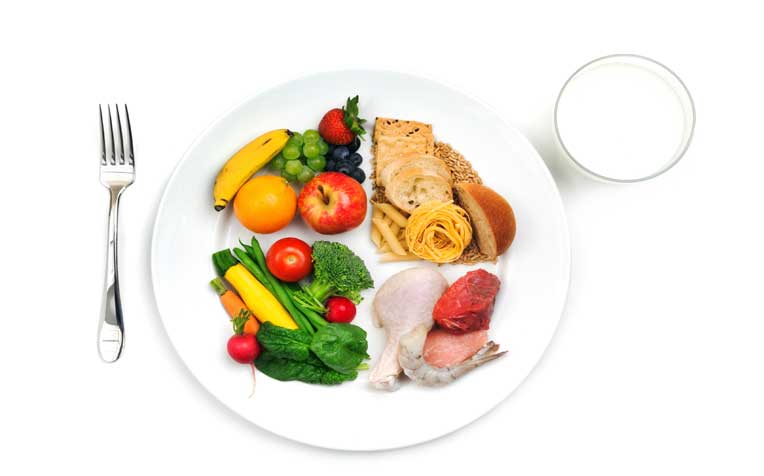
A healthy and well-balanced diet, along with regular exercise, can lower your risk of getting diseases and becoming overweight.
At your next meal, take a close look at what is on your plate. Are you having a well-balanced meal as recommended by HPB's My Healthy Plate?
A healthy diet: what you need to know

You should consume the following foods and servings every day:
Half of your plate with fruits and 2 servings of vegetables
Quarter of your plate with wholegrains (rice and alternatives)
Quarter of your plate with meat and alternatives
Small amounts of healthier oils
“Together with regular exercise, a healthy and well-balanced diet can help to lower your risk of getting diseases like diabetes, high blood pressure, high cholesterol, and becoming overweight,” says
Dr Ian Phoon, Consultant at
SingHealth Polyclinics -
Pasir Ris, a member of the SingHealth group.
For a better idea of what to put on your plate, see this diagram below!

Rice and alternatives
For a healthy diet, increase your intake of whole grains or “good” carbohydrates. It has been found that whole grains lower the risk of cardiovascular disease and type 2 diabetes, protect against cancers such as colorectal and oesophageal cancer, and help in weight management.
According to the 2004 Nutrition Survey, more than half of Singapore’s adult population consumed adequate amounts of rice and alternatives but only had 0.2 servings of whole grains per day.
Popular food choices: Rice, noodles, pasta, bread and potatoes
Healthier options: Wholemeal bread, brown rice, brown noodles, and oats
Fruits and vegetables
Opt for fruits and vegetables of various colours for their phytochemicals — chemical compounds which help prevent chronic illnesses and have cancer prevention properties. Additional benefits include a lesser chance of a heart attack, stroke and high blood pressure, and a reduced risk of eye and digestive problems.
Healthier options: A variety of different coloured fruits and vegetables, such as an apple, pear, orange, a wedge of papaya or water melon, or grapes; leafy vegetables, or non-leafy vegetables like carrots or tomatoes
Meats and alternatives
Avoid processed foods such as hot dogs or deli meat which are linked to a higher risk of cancer, heart disease and diabetes.
Limit eggs to not more than three to four per week as the yolk is high in cholesterol. Internal organs like liver and intestine are also high in cholesterol, says Dr Phoon.
Popular food choices: Red meat such as beef and mutton, whole milk
Healthier options: White meats such as chicken and fish, tofu, low-fat milk
Good fats, bad fats
Choose “good” fats (monounsaturated and polyunsaturated fats) over “bad” fats (saturated and trans fats) which increase the risks of coronary heart disease and stroke. Three out of eight Singaporeans exceed the recommended intake of less than 300 mg of fats.
Popular food choices: Coconut milk (e.g. in curry or laksa), roti prata and deep fried foods
Healthier options: Soft margarine, vegetable oils such as olive, canola, sunflower, soy and corn, steamed or baked foods
Salt
Cut down on salt intake. Nine out of 10 Singaporeans exceed the daily sodium limit of 2,000 mg, according to the Health Promotion Board.
High salt intake is associated with a significantly increased risk of stroke and total cardiovascular disease, reveals a study in the British Medical Journal (2009). Research also suggests that reducing salt intake could slow the loss of calcium from bones that occurs with ageing.
Popular food choices: Instant noodles, canned foods and sauces
Healthier options: Fresh foods. Use less salt, sauce or gravy. Avoid finishing your soup
Sugar
Avoid a sugar-rich diet as it may lead to weight gain and dental caries.
Popular food choices: Soft drinks, bubble tea, coffee/tea with sugar or sweetened condensed milk
Healthier options: Opt for beverages with no sugar such as plain water (with or without lemon or lime squeezed in), “zero” or “light” soft drinks, coffee/ tea without sugar, or with artificial sweeteners
Avoid overeating
Many of us love eating, and it has become a favourite past time for us. But overeating can lead to obesity, which in turn, can lead to diabetes, high blood pressure, and high cholesterol. Learn to recognise if you’re beginning to feel full, and stop eating. Avoid finishing the food so as “not to waste” it.
Never too old to eat right
“As the saying goes, ‘We are what we eat’; food is an important factor in determining our health condition. Also, you are never too young or too old to start eating right,” notes Dr Phoon.
Ref: O17
More artices on food and nutrition:
Contributed by

















 Get it on Google Play
Get it on Google Play